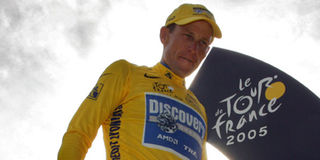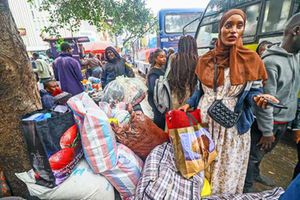Cycling chiefs cast out Armstrong as ban confirmed

PHOTO | JOEL SAGET A file picture taken on July 24, 2005 shows the overall winner US Lance Armstrong standing on the winners' podium after the 21st stage of the 92nd Tour de France cycling race between Corbeil-Essonnes and the Champs-Elysees in Paris, 24 July 2005. Lance Armstrong was banned on October 22, 2012 by the International Cycling Union (UCI) as the world cycling body upheld an earlier doping sanction handed to the seven-times Tour de France champion.
What you need to know:
- The International Cycling Union (UCI) said it supported the US Anti-Doping Agency (USADA) decision to erase the rider's entire career after August 1, 1998, as president Pat McQuaid called the scandal "the biggest crisis" the sport had faced
- The US body earlier this month released a devastating dossier on Armstrong, detailing over 202 pages and with more than 1,000 pages of supporting testimony how he was at the heart of the biggest doping programme in the history of sport
- Armstrong's Tour victories are unlikely to be re-awarded, the race's director Christian Prudhomme has said. The void would prevent further headaches, given that most riders who finished on the podium in that time have since been implicated in doping
GENEVA
Lance Armstrong was on Monday stripped of his record seven Tour de France titles and given a life ban, as cycling's world governing body said the US rider should be permanently erased from the sport's history for doping.
The International Cycling Union (UCI) said it supported the US Anti-Doping Agency (USADA) decision to erase the rider's entire career after August 1, 1998, as president Pat McQuaid called the scandal "the biggest crisis" the sport had faced.
Cycling federations, race organisers and former riders broadly welcomed the decision as an inevitable step but the USADA said more needed to be done to stamp out doping and restore the sport's credibility.
"There are many more details of doping that are hidden, many more doping doctors, and corrupt team directors and the omerta has not yet been fully broken," said USADA head Travis Tygart.
Punishing Armstrong and riders who came forward to talk about his activities cannot be seen as "penance for an era of pervasive doping", Tygart added, calling for an independent truth commission to spur reform and break with the past.
The UCI earlier rejected a potentially lengthy legal challenge at the Court of Arbritration for Sport to the USADA claims and punishment against Armstrong.
"The UCI will strip him (Armstrong) of his seven Tour de France wins. Lance Armstrong has no place in cycling... He deserves to be forgotten in cycling," McQuaid told a news conference in Geneva, saying he was "sickened" by the revelations.
The US body earlier this month released a devastating dossier on Armstrong, detailing over 202 pages and with more than 1,000 pages of supporting testimony how he was at the heart of the biggest doping programme in the history of sport.
The revelations, including evidence from 11 of Armstrong's former team-mates, plunged a sport which has been working hard to rid itself of its murky doping past into crisis.
McQuaid succeeded Hein Verbruggen as president of world cycling after Armstrong's seventh and final Tour victory in 2005 and is credited with boosting the body's anti-doping programme, notably with the pioneering blood passport scheme.
The Irishman was under pressure to answer how Armstrong and his teams managed to dope for so long without being detected. But he rejected calls to quit, vowing to continue his work against the use of banned substances.
Armstrong's sporting reputation as the cancer survivor who fought back to win cycling's most gruelling and celebrated race has been shattered since the report was published.
On Monday, sunglasses manufacturer Oakley became the latest high-profile sponsor to ditch the fallen star.
There have also been fears of a wider withdrawal of financial backing for the sport after Dutch sponsor Rabobank said it was ending the sponsorship of its professional cycling team after a 17-year association.
The sponsor described professional cycling as "sick" to its core and unlikely to recover in the foreseeable future.
The strongly-worded comments went to the heart of claims of failings at the UCI and in particular to McQuaid, who has been criticised for failing to see the extent of doping within the sport.
Verbruggen, who stepped down in in 2006 but remains honorary president, ran the UCI during Armstrong's golden era, amid claims that Armstrong and his team-mates evaded dope tests either by hiding or being tipped off in advance.
The Dutchman has also been accused of protecting Armstrong -- even accepting a donation to cover up a positive dope test. McQuaid on Monday said the UCI "absolutely deny" that Armstrong bought off the body.
There were still calls for the UCI high command to quit, however, most notably from former Spanish rider Oscar Pereiro, who won the 2006 Tour de France after US rider Floyd Landis, Armstrong's former team-mate, was disqualified for doping.
Pereiro told AFP: "If the accusations of Lance's former colleagues prove accurate, for instance saying they were tipped off ahead of tests, then the UCI is also caught up in this -- they should all resign."
Armstrong's remarkable cancer backstory and Tour triumphs from 1999 to 2005 were seen as key to restoring cycling's tattered image after a string of high-profile doping scandals in the 1990s.
His Tour victories are unlikely to be re-awarded, the race's director Christian Prudhomme has said. The void would prevent further headaches, given that most riders who finished on the podium in that time have since been implicated in doping.
But the final decision will come in a special UCI meeting on Friday.
Armstrong has yet to comment directly on the affair, saying only that recent weeks have been "difficult" and standing down as the head of the cancer foundation Livestrong that he set up in 1997 and which has raised more than $500 million.




